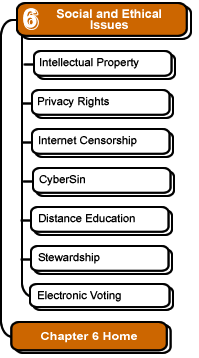

Internet Censorship
Because the Internet provides easy and "anonymous" access to pornographic materials, many institutions (such as schools, colleges, companies, and libraries) have implemented Internet filters. Filtering software acts as an intermediary between the Web browser and the Internet, blocking access to materials deemed inappropriate or objectionable for a given audience.
How do the
filters work?
Some filters
work by blocking known websites that contain objectionable material;
others use a list of banned words. If the requested webpage contains
a banned word, the page is blocked. Others check the pages for embedded
codes that indicate the page is not intended for children. Some filtering
companies use human employees to check webpages and make a judgment whether
to block or not. A combination of these techniques can be used as well.
Some filtering packages allow the system administrator to configure and
customize the filter; for example, the software might allow the administrator
to add words to the banned list, or to remove words from the
list. Many packages also allow users to bypass the filter if they have
the correct password.
What is considered
"objectionable"?
Filters might
block sexually explicit text or photographs, hate speech, pages meant
to incite violence, instructions on building weapons, and so forth.
Is it censorship?
Opponents of filtering software claim that the filtering imposed by an institution such as a school or library is censorship. The filter prevents free access to information. Users complain that involuntary Internet filters:
- violate an individual's right to free and full access to information
- violate the website's freedom of speech rights
- impose one person's moral standards on another person
- have technical
problems:
- may block pages that are not necessarily objectionable, such as a page about breast cancer that is blocked because of the word breast.
- may fail to block a page that is objectionable, such as a page that contains pornographic images but does not contain any banned words
- reduces performance (loading pages takes longer because they must be checked first)
- prevents complex Web interactions, e.g., may cause trouble with connecting to downloadable software modules
- banner ads with objectionable material cause the entire page to be blocked
Advocates of filtering software claim:
- Filtering within a corporation prevents employees from wasting company time; within a school, it prevents children from accessing materials parents would find objectionable, inappropriate, or harmful.
- Allowing individuals to access pornographic materials in a public area could be considered sexual harassment to others that can view the screen, exposing them to objectionable material.
- Filters block immoral, harmful, and sometimes illegal materials from entering a community.
- The filter is imposed by the owner of the equipment, who has the right to dictate the terms of use for the equipment.
- It is unreasonable to object that filtering involves imposing one's views on another; in any society, one group's view will always be imposed upon others. The question is whether the view imposed is ultimately the correct one.
Learn more about Internet censorship by reading the two articles below. Calvin University (formerly Calvin University (formerly Calvin College)) uses filtering software on some of the campus computer resources, specifically, Internet access from dormitory student residences. The decision to do so generated some controversy on campus. The two articles below represent two points of view on the issue. The first is written by the Vice President of Student Life at Calvin University (formerly Calvin University (formerly Calvin College)), defending the decision to implement filtering. The second article is written by a Calvin University (formerly Calvin University (formerly Calvin College)) professor of computer science. Although his article is not written to directly address the specific issue of filtering at the College, it explores freedom of expression in the age of the Internet.
- Competing
Interests: A Rationale for the ResNet Filter
by Shirley V. Hoogstra - Freedom
of Expression, Filtering, and Censorship
by Joel Adams
![]()
![]()
These pages were written by Steven H. VanderLeest and Jeffrey Nyhoff and edited by Nancy Zylstra
©2005 Calvin University (formerly Calvin University (formerly Calvin College)), All Rights Reserved
If you encounter technical errors, contact computing@calvin.edu.